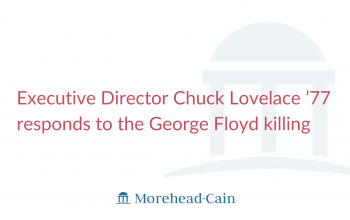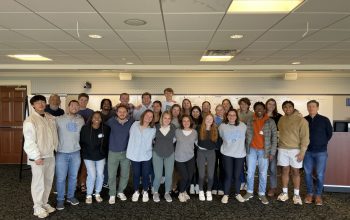A Message to the Morehead-Cain Community from David C. Wright ’80 and Charles E. Lovelace, Jr. ’77
Dear Morehead-Cain Community,
It has never been the mission of the Morehead-Cain Foundation to make pronouncements on the issues of the day. Our mission, rather, has been to identify, invest in, support, and send forth leaders. That was the hope and charge of our benefactors, who felt that the best way to effect societal change was through investing in young leaders. We remain committed to the primacy of that mission.
Similarly, we have never viewed the Foundation, as an institution, of having a distinct, special, or transformative voice. Rather, we have valued, promoted, and reveled in the voice that our community–our scholars and our alumni–has brought to bear on vexing problems, injustice, and the need for change.
But.
To every rule there is an exception. And remaining silent now–at this moment when many in our community are deeply wounded and hurting–is not right.
So we, as Chairman and Executive Director of the Morehead-Cain Foundation, wanted to speak directly to you.
This year marks the 75th anniversary of the Morehead-Cain Foundation. There is so much to celebrate, but as we consider our history in the context of current events, we admit and reckon with the racism in our own past. The Morehead Scholars Program did not admit African American students until 1969. That was wrong.
Racism is wrong. It should have no further place in our society, in our decision making, in our institutions, or in any part of our social order. But it exists. And, if we’re honest, it is not just “out there,” not just in the criminal justice system or law enforcement, but it is in many of us. Many of our thoughts, our actions, our values, and our direction have been shaped by our own selfishness and our own desire to exalt ourselves above others, including those of a different color, ethnicity, or background.
Each of us recoiled when we learned of the murder of George Floyd. But, truth be told, the two of us missed the depth of the sadness and anger this incident generated in the African American community, and in the Morehead-Cain community. We don’t pretend to any greater wisdom than others on this incident or on police brutality, which is all too often affected by racial motives. But as we have reflected, and listened, this murder was both different and metaphorical. A white man placidly subjugating an innocent black man with just his knee. That same white man remaining silent, silent, for nearly eight minutes, as the black man cried out. No one–no one–coming to help. This was no momentary lapse of judgment or flare-up of irrational anger. No one here was quick to the trigger or mistook the aggression of another. This was just horrible, and emblematic–in a too-real fashion–of the degradation of African Americans in our society and in our history. And shame on us for not appreciating the depth of this feeling and its symbolism soon enough.
So what to do?
We (including those of us at the Foundation and in our community) need to listen more. We need to have deeper empathy. We need to be unequivocal in our condemnation of racism. We need to join with voices at our University, speaking to this issue–like the Chancellor and the UNC General Alumni Association. And we need to acknowledge the times we have ignored or fallen short personally and institutionally in this regard. Chuck addressed this in part in a letter to our scholars.
The Foundation is committed unwaveringly to the emotional, mental, and physical safety and well-being of our scholars, including, in particular, our African American scholars. We delude ourselves if we think that being black anywhere in this country, including in Chapel Hill, yields equal treatment from law enforcement. That does not mean that every law enforcement officer or every participant in the criminal justice system acts from opprobrious motives in carrying out their duties. But you will be hard pressed to find any African American alum who will not tell you, with some grief and anger, about being stopped, questioned, or detained for reasons that emanated principally from the color of his or her skin. As much as many of us would like to, we cannot and must not ignore that.
And we must–as a society, as a community, and as an institution–commit to the work of racial reconciliation. The Foundation is going to pursue that. There is much to do and there are many more conversations about how the Foundation might help address this issue and continue to do this work. We don’t expect to figure this out overnight–not when the problems are so deep, so personal, and so systemic. Addressing historical inequities will take persistent, long-term efforts. But we’re going to try. And we’re going to do it while keeping our scholars safe and helping them thrive in every way and in every aspect of their lives. And this will include extra attention to our students of color.
This communication, frankly, is a bit out of our comfort zone. But we had to speak to you about this. Silence is just not an option.
We encourage you to continue to provide us your thoughts. We are proud of you and committed to our mission of investing in leaders who will make a difference, including in eliminating the blight of racism. Thank you for your support in this difficult time. Please stay safe and healthy.
David C. Wright ’80
Chair, Board of Trustees
Charles E. Lovelace, Jr. ’77
Executive Director



